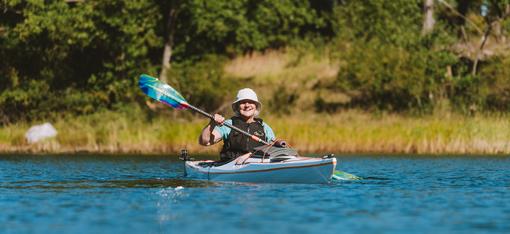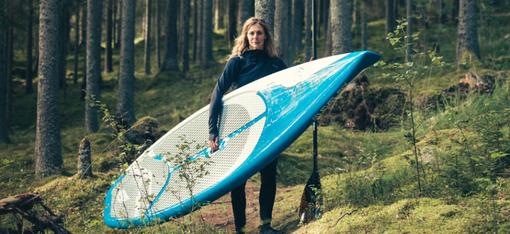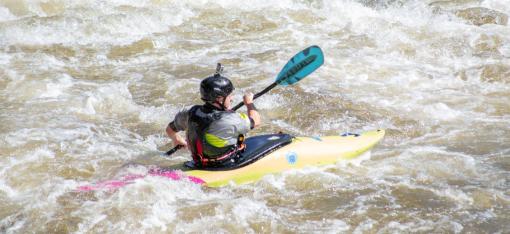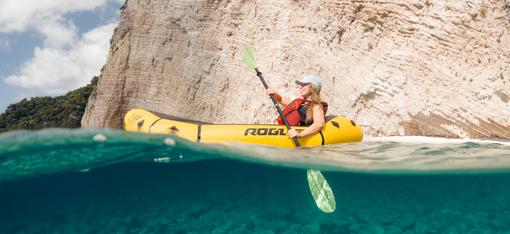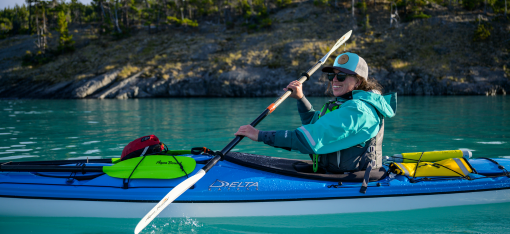An Epic African Paddle Adventure [Part 2]
We follow up here with adventurer and conservationist, Ross Exler, about Ross’s kayak and bike journey through the African Great Lakes…

If you haven’t read An Epic African Paddle Adventure, the post tells about Ross’s goal of kayaking and biking unsupported through the African Great Lakes system—Lake Malawi, Lake Tanganyika and Lake Victoria—and the land connecting them.
Ross was on his expedition for 3 months during the (North American) winter of 2018. He covered about 1,000 miles and put in around a million paddle strokes with his Tango Carbon paddle.
We managed to catch Ross for a phone interview about African paddle trip before he left for another adventure in Botswana:
AB: Did you fulfill your goals for your African Great Lakes trip?
ROSS: I set a number of different rules for myself in order to achieve it as self-sufficiently and in the purest manner I could. One was not to have to use any outside assistance at all for my traveling.
On one biking portion, between Lake Malawi and Lake Victoria, I was just unable to get my kayak and all my equipment up a huge escarpment on my bike. So I put it all on a bus and sent it to the next town. I bicycled up to it and picked it up there. That’s the one “blemish”!
Other than that, from start to finish the enchainment of the lakes was entirely self-powered, either by kayak or bicycle. That was my major goal, as well as being able to fully immerse myself in the region—which I was able

to accomplish a hundred percent.
It was an extraordinary experience for me!
AB: You wanted to learn more about the environmental issues in that region, too. Tell us about that.
ROSS: I could really see the differences between the different lakes, and even the subregions along the lakes. I was able to interact with the people, various agencies and government groups that work in this vast region I covered.
I saw quite a few things that may result in pessimism, but also a few more optimistic.
These lakes are of global significance for biodiversity, especially of fish species and as a source of fresh water. Unfortunately, they face a lot of environmental challenges due to deforestation, certain agricultural practices and over-fishing.
Some of the places that were better protected geographically are still pristine. I was able to meet with folks from the Nature Conservancy in Africa and observe their work with many of the local communities. Their goal is to improve the lives of the people there by teaching them sustainable techniques for fishing and agriculture, among other skills.
The way they’re working with and engaging local people is very promising. Where they’re working along parts of Lake Tanganyika really was the beautiful wilderness experience I was hoping for, while Malawi and Victoria are much more degraded.

As expected, the more remote areas are more pristine while near the big population centers the degradation rapidly increases.
The need is to try and create a sustainable future for both the people and the environment. An environmental disaster will be followed by a humanitarian disaster.
AB: Were there any surprises on your trip that stood out to you?
ROSS: One thing that wasn’t a surprise but that I had to rely on was the consistent kindness and welcoming nature of people during the entire trip. I was always welcomed in to spend the night wherever I asked.
I’ve spent a lot of time in the Amazon in a small boat, and the storms there are very powerful. I was surprised how the storms on these equatorial lakes in Africa seem to harvest energy from the lakes. They appear and disappear with shocking speed.
Also, I tend to over-prepare in terms of equipment. I was amazed at how well my whole set-up survived the entire trip, including my paddle. I loved its weightlessness and how it powered my kayak full of gear without a problem. I had a 4-piece Eagle Ray Carbon as a backup paddle, but never needed to take it out.
You can train and prepare for a trip like this, but it’s really an experience to be out there by yourself. To watch your own capability grow.
At first I would count my paddle strokes, but later in the trip I would paddle the entire day without even thinking about it. It was as natural as breathing. Experiencing that was cool. Having a really light and stiff paddle was something I certainly never got tired of! One of the big advantages of the entire trip.
AB: What was your toughest challenge on this trip?
ROSS: That’s easy! I was on Lake Tanganyika in a really remote section. I was hit by these seasonal winds that generally only last a day or two. They’re fierce—blowing about 20 knots and kicking up big waves. These lasted for eight days out of the north, a headwind for me.
During that period of time my daily average dropped from 30 miles a day to barely eking out 15 miles, completely exhausted. Ocean-sized waves were crashing against the rocky shores, so I had to be really careful landing.

I got to a point where I knew I’d need to request permission to camp in a national park on a beach. But these small areas are usually along a fresh water creek and with high populations of crocodiles and hippos. I wasn’t very excited about doing that!

I spent a very long and tense night south of a point I had tried to paddle around three times in 4-meter waves. The lowest point was laying on that rock that night debating whether I should throw in the towel.
I woke up in the morning, and this was one of the great moments of my life: I paddled out and there was a gentle south wind after an eight-day consistent, violent north wind. It gained strength over the next hour, and I enjoyed a 15-knot tailwind the rest of the day!
AB: Is there anything else you’d like your readers to know?
ROSS: It certainly takes a healthy amount of preparation and acquired skills and expertise to pull off this kind of thing. But a lot of it is also determination.
A lot of places that are really wild and remote in the world are really approachable. You’ll find out the world’s not really that big. It’s just another place where people are living their lives. If you’re inspired to go there, then take the necessary steps to become competent and go for it! Life’s short.
And thanks to Aqua-Bound for being supportive and believing in my vision!

(All photos courtesy of Ross Exler)
Contact our Wisconsin-based Customer Service team with your paddle questions today:
More for you…
An Epic African Paddle Adventure (Part 1 of Ross Exler’s story)

